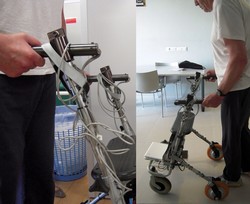High tech help for elderly to prevent falls
The EU-funded I-DONT-FALL project was launched in April 2012 to deploy, pilot and evaluate a range of innovations to detect falls and prevent injuries. Project partners provided innovative solutions that were then integrated into a platform; these were then tested by over 500 elderly patients across Europe. The platform was flexibly configured to suit the needs of and risk factors associated with fall incidents, which account for approximately 40 % of all injury deaths. Enabling medical experts and health professionals to customise innovative fall solutions to specific end user needs will save lives and cut healthcare costs and to this end, identifying opportunities to commercialise these innovations is ongoing. Proving their worth ‘Some of the key innovations we are most proud of include a cognitive rehabilitation platform; a robotic rollator – the iWalker – to support patients in physical rehabilitation; a wearable inertial unit to track gait and detect falls and a mobile android-based device connected to the iWalker that sends data to an electronic medical record,’ says project coordinator Matteo Melideo from Engineering Ingegneria Informatica SpA in Italy. ‘We also tested a remote monitoring fall detection system on 24 patients, which demonstrated promising results from a technical point-of-view.’ The results have been impressive. Project trials of these innovations at selected sites demonstrated an impressive 43 % reduction in falls with respect to the previous year, an increase of 4 points in the BARTHEL Index, which measures performance in daily activities, and a two-point increase in the Quality of Life index. Furthermore, the huge amount of data collected will feed into further studies and analysis. ‘The contribution of clinical partners was invaluable to the success of this project,’ says Melideo. ‘If they firmly believed in a solution, then they could more easily convince patients to participate in this project.’ Identifying market potential Once clinical validity has been demonstrated, the next step is to develop these tools further and to identify pathways towards commercialisation. A key benefit of the project has been its focus on achieving a deeper understanding of end user needs through careful market analyses. These have provided partners with guidance on how they can most effectively move towards effective commercialisation, following completion of the three and a half year project in September 2015. ‘Some clinical sites involved in the project have already put in places services based on I-DONT-FALL solutions,’ says Melideo. ‘Those having most penetration so far appear to be solutions based on cognitive rehabilitation, which are currently being used at four partner clinics: Fondazione Santa Lucia in Italy, Frontida and Municipality of Kifissia in Greece and Sermas in Spain. It is important to note however that most potential customers of I-DONT-FALL solutions are public institutions, and for the moment at least, no public tenders have been launched.’ Nonetheless, project partners are currently working towards potentially commercialising key project outcomes. UK eHealth solutions provider Docobo, for example, is examining possible synergies between new fall prevention tools and existing applications for elderly care. An outline ‘Memorandum of Understanding’ with fellow project partner Universitat Politècnica de Catalunya (UPC) and sister university IBEC in Barcelona has also been established to further develop the iWALKER in order to specifically address rehabilitation, brain injury and elderly care market segments. This will be achieved by offering a range of modular versions of iWALKER that address different needs of the market. ‘The value and effectiveness of the solutions developed through the I-DONT-FALL project will be further maximised through tailoring innovations to specific target groups and examining market opportunities,’ concludes Melideo.



